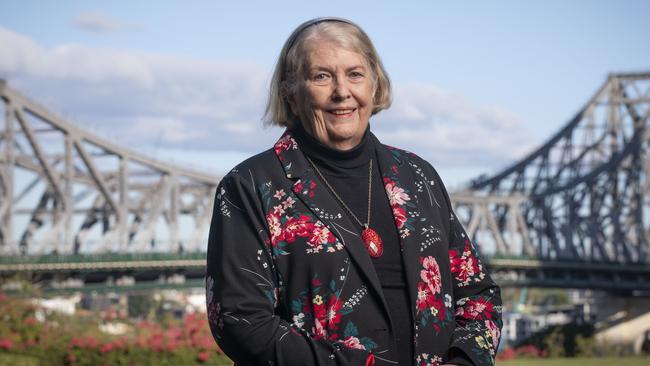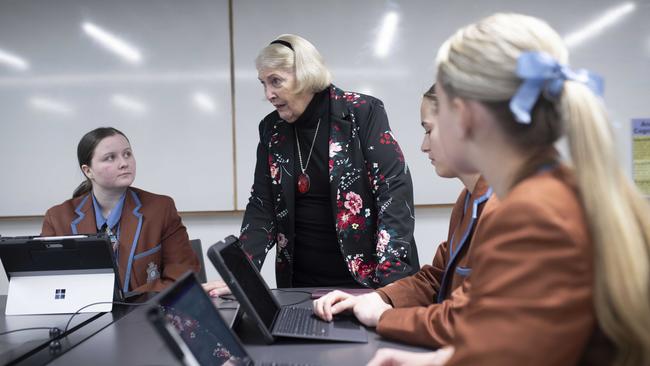Laid-back lucky country still the pride of Australians but some things are slipping
The Weekend Australian’s Needs of the Nations survey reveals that most Australians see themselves as easygoing, friendly, hardworking and generous.

Sixty years ago, Elaine Roberts taught a classroom spilling with 62 students, yet was paid 25 per cent less than the young man teaching a much smaller class at their school on Queensland’s Sunshine Coast.
When she married at the age of 23, legislation required her resignation, so she timed the wedding at the end of a school break to pocket the holiday pay.
“It was galling – but that was the way it was,’’ Roberts recalls of the women’s work hurdles early in her career.
“We were not inclined to buck the system because we were some of the first who had done Year 12.’’
Roberts took time out of paid work to raise her four children, before teaching at TAFE and earning a PhD in workplace education in her 60s.
A pioneer of workplace learning in Australia, the ebullient Roberts is still teaching at 83, instructing students in high schools across Brisbane in a diploma of project management through her consulting business, Management Frontline.
Her lessons incorporate what she describes as “support for the Aussie values of a fair go, a respect for the rule of law, helping the neighbour and your mates, and not cheating”.
Roberts has lived through Australia’s gender-equality evolution and multicultural revolution over the six decades since News Corp chairman emeritus Rupert Murdoch founded The Australian as the national newspaper.
She lauds Australia as “the lucky country’’ – albeit “a bit frayed around the edges’’.
“Anyone who really wants to go forward honestly, and who works hard and wisely, can make it,’’ she said.
“Australia is the multicultural miracle of the world that punches above its weight in almost any field of endeavour. “However, the promotion of a splinter culture is becoming more of a problem, as is the sense of entitlement.
“The motto ‘Nothing without work’ is still the way forward.’’

Roberts’ sentiments are reflected in The Weekend Australian’s exclusive Needs of the Nation Survey conducted for The Australian’s 60th anniversary this month, which reveals that most Australians see themselves as easygoing, friendly, hardworking and generous.
The sense of national pride has slipped over the past decade, however, and many Australians feel despondent about the future.
Only three-quarters of the 1042 people surveyed by The Growth Distillery this year declared they are proud to be Australian – well down from the 92 per cent recorded in a comparable Newspoll survey in 2014.
Likewise, only 77 per cent of people feel Australia is the best, or one of the best, countries in which to live, compared to 92 per cent a decade ago.
The pandemic, along with a cost-of-living crisis, a housing shortage and international turmoil, have left many Australians feeling fearful of the future. Barely half say they are optimistic about the future, and just 13 per cent feel strongly that the future looks bright.
Two-thirds of people surveyed describe Australians as “lazy’’ (down from 77 per cent in 2014), and 62 per cent felt Aussies are “whingeing’’ (down from 82 per cent).
Many Australians are pining for the past, with half the people surveyed citing safety, childhood and lifestyle as better 60 years ago than now. Half of Australians feel that children growing up in 1960s enjoyed a more carefree and relaxed childhood than kids today. Just 15 per cent feel Australia is a safer place today, and 18 per cent think it is now easier to afford a comfortable lifestyle. But 43 per cent believe today’s young people have better career choices than those growing up in the 60s.
Roberts agrees that today’s school leavers have more opportunities to study and launch interesting careers.
“Women these days can have it all,’’ she said.
“They can have a career and a family – but mind you, it is very hard work indeed.’’

Roberts acknowledges that her own childhood, growing up in a close-knit family in the 1940s and ’50s, offered “character-forming’’ advantages.
“There was an expectation of caring for each other and playing a role in the community, along with respect for everyone, no matter what the job was,’’ she said.
“The rubbish man needed to be greeted with the same politeness as the visiting bishop.
“Nowadays there seems to be a pervasive attitude that unless someone is very rich, they are not entitled to respect.
“The volunteer workers and the kindly people around us are simply amazing.’’







To join the conversation, please log in. Don't have an account? Register
Join the conversation, you are commenting as Logout